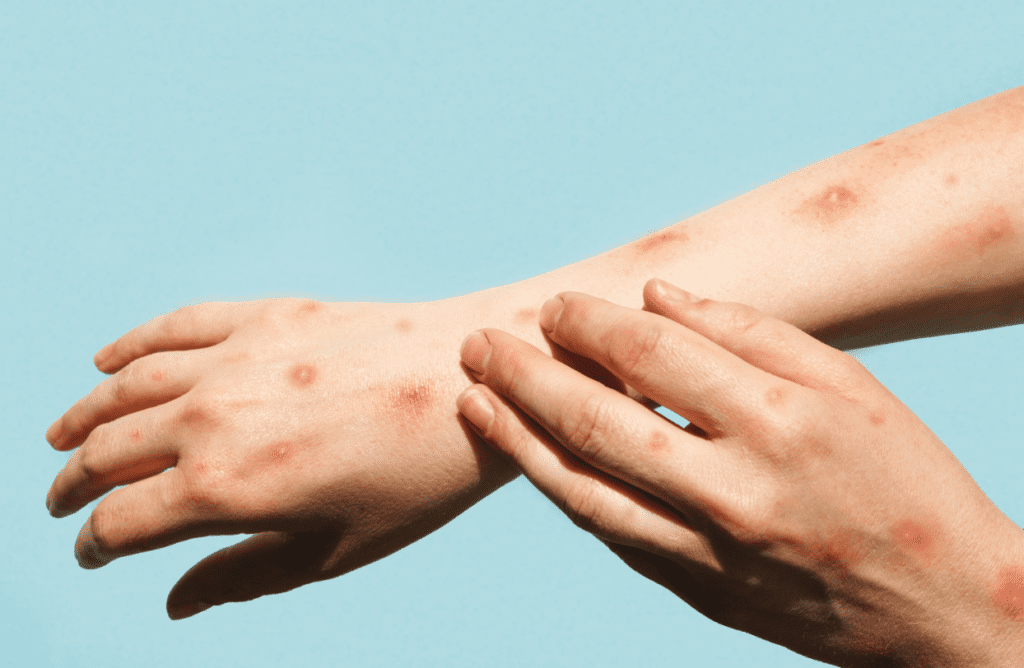by Gertrud U. Rey


The prevalence of monkeypox cases is continuing to increase around the world, with 7,243 total confirmed global cases as of today. Although this sounds awfully familiar, monkeypox virus is highly unlikely to cause a pandemic like the one we are presently experiencing, for at least two reasons: 1) monkeypox virus is not transmitted as easily as SARS-CoV-2, and 2) we have all the tools needed for quelling local outbreaks, thus hopefully preventing further community spread.
Because monkeypox has been endemic to Central and West Africa for several decades, scientists have had ample time to develop a thorough understanding of the virus and its associated disease. Monkeypox virus belongs to the Poxviridae, a family of viruses that also includes cowpox virus, variola virus (which causes smallpox), and vaccinia virus (the source of the modern smallpox vaccine). The name “monkeypox” resulted from the fact that the virus infects primates and was initially isolated from a laboratory monkey. However, it is actually thought to also circulate in rodents, which occasionally come into contact with humans, who can then further spread it to other humans.
Human-to-human transmission of monkeypox virus is far less efficient than that of SARS-CoV-2, which is commonly spread in the absence of symptoms, whereas monkeypox virus is only thought to be transmitted while an infected person is symptomatic. In addition, SARS-CoV-2 is readily spread when an infected person breathes, sneezes, or coughs around other people. In contrast, monkeypox virus is only transmitted by direct contact with lesion material or inhalation of respiratory droplets during prolonged face-to-face interaction with an infected person. Recent news reports have highlighted clusters of infections among men who have sex with men, leading some to infer that monkeypox is a sexually-transmitted disease. However, there is no evidence to suggest that the virus is present in sexual bodily fluids, therefore, it is not considered to be a sexually-transmitted pathogen. The high incidence of infections in the gay community could be explained by transmission through very close contact, which, by definition, includes sex.
The incubation period for monkeypox virus can range from 5 to 21 days, with an average of one week between infection and onset of symptoms. Initial symptoms usually include fever, swollen lymph nodes, headache, and muscle aches; and these symptoms are followed by a distinctive skin rash consisting of clear fluid-filled vesicles. The vesicles eventually fill with pus and ultimately crust over to give way to a new layer of healthy skin. Early symptoms are similar to those of chickenpox, which is caused by varicella-zoster virus (a herpesvirus, unrelated to poxviruses). However, unlike chickenpox lesions, which can individually exist in different stages of development throughout the course of infection, monkeypox lesions typically appear, progress, and disappear together.
Should the need arise, there are at least two licensed smallpox-specific vaccines that can also prevent monkeypox. ACAM2000 is a replication-competent live-attenuated vaccinia virus developed by Sanofi Pasteur Biologics Co. This vaccine is administered with a traditional bifurcated needle, and although very effective, it is associated with pretty severe side effects, including sore arm, fever, body aches, and occasional myocarditis. MVA-BN (marketed as “Jynneos” in the US) is a highly attenuated replication-incompetent vaccinia virus produced by Bavarian Nordic. MVA-BN/Jynneos is delivered by injection under the skin, is much better tolerated than ACAM2000, and is approved to be used as a monkeypox-specific vaccine. Fortunately, because of the long incubation period, it is possible to be vaccinated shortly after an exposure to monkeypox virus and still be protected from monkeypox disease.
It is unclear how long either of the available vaccines protect a person from disease, and whether individuals who were immunized against smallpox decades ago are protected from monkeypox today. Routine global smallpox vaccination ended in the late 1970s, so it is likely that the current outbreaks are fueled by non-immune people who were born since then, and/or by vaccinated individuals whose immunity has waned. However, even if infections continue to increase in number, it is unlikely that everybody in the general population would need to be vaccinated. Instead, proactively administering the vaccine to contacts and contacts of contacts of an infected person in a strategy termed “ring vaccination” would probably be sufficient to stop spread. That is, the vaccine would be administered in an area in a ring around the outbreak.
There are also several FDA-approved antiviral drugs that could be effective against monkeypox virus infection. Tecovirimat, which can be taken orally, prevents release of newly formed viral particles from infected cells, thus potentially blocking transmission of monkeypox virus. Cidofovir (administered by infusion into the vein) and its derivative brincidofovir (taken orally), disrupt replication of smallpox virus and could thus also be used for treating monkeypox virus infection.
Considering all these factors, the average person is at low risk of becoming infected with monkeypox virus. Nevertheless, the World Health Organization has declared that there is no room for complacency and is urging governments to take some coordinated action to stop the spread of the virus. Because we have the tools to deal with monkeypox outbreaks and have hopefully learned from the disorganized manner in which the present pandemic was handled initially, a federal preparedness response should be implemented as soon as possible.
[The monkeypox outbreak was previously covered at least on Infectious Disease Puscast episodes 3 and 4; TWiV 902, TWiV 915; and TWiV Special Monkeypox Clinical Update with Dr. Daniel Griffin.]

To a certain extent, it depends on how much profit big pharma needs this year (Junk DNA R Us).
Wow, what a clear and informative article!
Thanks for an interesting round up. As a small correction, brincidofovir is given orally.
Dom, thank you for pointing that out! I have made the correction.
Thanks, Gertrud U. Rey for sharing this information. I agree that Monkeypox is unlikely to cause a pandemic like COVID-19, given some diagnostics and vaccines available already.